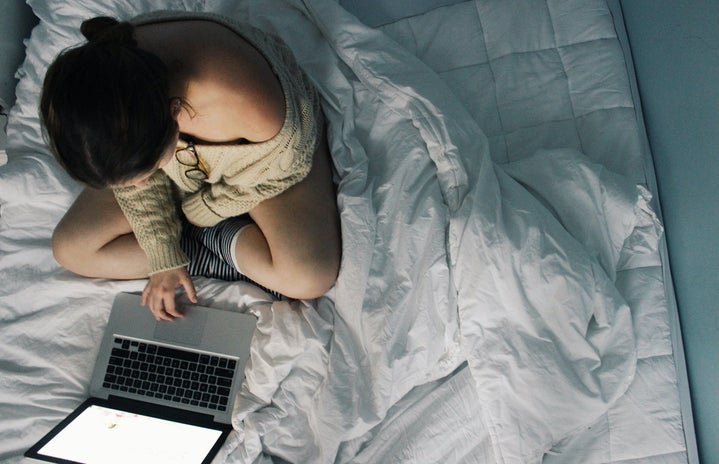Looking back, I really enjoyed my freshman year of college. I did relatively well in my classes, learned more about what I was interested in academically, and made the friends and connections that I have to this very day. And I somehow managed to do this all while being very sleep deprived! The most impressive part of this being that I wasn’t even aware of it until a year later, when I returned to Richmond the following year with a very different living situation.

Sleep and sleep deprivation have been studied in vast amounts for many years. Why? Because it is such an integral and important part of our day. Sleep allows our bodies and minds the opportunity to rest up and recover from what can often be a chaotically busy day. From an early age, it is pushed on us to get our full eight hours nightly. As a child, pre-teen and even college student, I always found this to be mildly irritating. Yes, I was obviously getting plenty of sleep, and even if I wasn’t, I could always make up for it later. And if I couldn’t find the time for that, I could always just drink an extra coffee. It was exactly this kind of mentality that ended up with me drifting through my days in a haze. I got so used to waking up in the early having gone to bed only hours before that all of this seemed normal. And to a certain extent, it was. Many of my friends (who also lived in dorms) were experiencing the same thing. We all had similarly horrible sleep schedules, and it was more of an ongoing and inconvenient joke rather than being viewed as a serious issue.
When thinking back, I realize that I was completely unaware of my state of exhaustion. As dramatic as it sounds, going off of an average of four to five hours of sleep a night can start to cause some pretty drastic changes. I remember being moodier and more likely to snap at people. Little things that wouldn’t normally have bothered me were suddenly a big deal. My weird sleeping habits also made it so I would eat strange things at equally strange times. Needless to say, an entire box of Insomnia cookies at 3 a.m. (although delicious) is not a sufficient or particularly nutritious dinner. In addition to this, as fun as college can be, it also tends to (rather regrettably) include a lot of school work, and staying on top of it can often be a struggle. I found the experience doable, but looking back, I still know that I could have avoided a lot of stress and hard deadlines if I had just decided to go to bed early rather than stay up with friends watching the same horrible movies over and over. Amazingly, freshman me still didn’t attribute this added stressor as an issue. Rather, if my brain was fuzzy for an exam, I would chalk it up to early hours, nerves, or being a bad test taker instead of acknowledging that I had slept a solid four hours the night before.

I truly think the only reason that I eventually did come to realize how sleep deprived I was as a freshman was when I started to compare it to my time as a sophomore. I had moved off campus by then, and my class schedule no longer consisted of the horrible combination of 8 a.m. classes and late-night courses. This separation from the dorms and a slight decrease in the newness and excitement of college made me go out less and stay in more. This, combined with my general love of naps and solid sleeping hours, meant that I spent plenty of time (if not too much time) getting the appropriate amount of needed rest. And so, suddenly, I was experiencing Richmond and my academics in a whole new world. I wasn’t walking around in a haze all the time, unplanned classroom naps ceased, and constant jaw splitting yawns were a thing of the past. And so, a full year later, I was finally forced to admit that my freshman year (although enjoyable) had been more fueled by caffeine and sugar than actual rest. It was almost impressive how my late nights and early mornings had become such a normal that instead of trying to fix it, I simply tried to nap away the issues. However, studies (and personal experience) show that this really isn’t the same thing. Being tired had become the new norm, and when compared to my much more toned down sophomore year, this was no longer an acceptable way of living.
I know that I wasn’t alone in this issue, and I also know that for many, this problem isn’t at all limited to just freshman year. Many of my friends struggled and are still struggling with this. Personally, I have become aware and noticed a definite improvement. However, it isn’t always simply a matter of realizing that it can cause the necessary change. I have a friend who finds herself unable to sleep due to academic stress. I have a friend on the pre-med track who is so consistently busy that he just can’t find time for his nightly eight hours, nevermind normal meals or self-care. I have another friend who has 8 a.m. classes every single morning and night shifts until at least midnight. These things aren’t always avoidable or easily dealt with, and that just makes sleep deprivation in college a more apparent and serious issue. Lacking sleep makes it harder to deal with general life things due to a lack of energy. This normally results in taking longer to finish the things you need to, which also normally ends in even less time to sleep. It’s a tragic and unending cycle of under-eye bags and exhaustion.

As I mentioned earlier, this isn’t something that can just be easily solved. Instead, I would advise that you simply pay attention to your body and its needs. Although it may not always be possible to give yourself the time you need, watching how you feel (physically or otherwise) is an important part of being able to continue functioning as a college student and human being. Even if it’s hard, at least try to give yourself the relaxation and recovery that you deserve when need be. I wish I had been more aware of this when I first entered college as I know my classwork, relationships, bank account (the cookies were not cheap), and general mental health would have benefited greatly.



